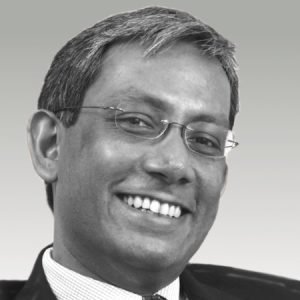
Ravi Venkatesan EP2
Guest is known for...
Ravi had a varied career, moving from heading Cummins in India to heading Microsoft and then leaving to pursue board memberships, writing, philanthropy, and mentoring start-ups. He discusses his transitions, leadership in social impact, and building a career in the gig economy.
Here's what I will learn...
The conversation explores the topics covered in the book “What the Heck Do I Do with My Life” which includes being intentional, cultivating an abundance mindset, different forms of capital, specialization versus generalization, and the phenomenon of stotting in the animal kingdom. The conversation also touches on the concept of punctuated equilibrium and its impact on adaptation.
LISTEN TO THE FULL CONVERSATION
From the Podcast
Ravi speaks about some of the choices he has made post his corporate career spanning Cummins and Microsoft. He speaks about how he has thought about the portfolio of things that he has architected and how the portfolio has evolved over time. He also discusses how one could think about doing one thing versus pursuing a portfolio.
Ravi speaks about the notion of punctuated equilibrium where long periods of stability are punctuated with occasional periods of extreme change. He speaks about such periods of extreme change can lead to a new kind of species flourishing on the other side of the change.
Ravi refers to the work of Charles Handy and says that in the future, there will be three broad kinds of work – Creatives, Caregivers and Custodians. He goes on to say that it is critical that we map ourselves into one or two of the three and develop deep capabilities to ensure that we are the top of that particular field as there is a significant risk of commoditization if we are an “also ran” in a field.
Ravi speaks about how it is very easy to drift through life and it is critical for us to be deliberate about the various choices we make. He urges to pay attention to what we are paying attention to.
Ravi speaks about how we can create a mindset of abundance even if we are in a situation where we might face material scarcity. He speaks about the link with Philanthropy and makes the distinction between having resources and being resourceful.
Ravi speaks about the different forms of Capital that we possess and how we can deploy that in the context of a situation. He specifically refers to the conversations at Social Venture Partners, a philanthropic organization I am a part of.
Ravi speaks about how he thinks about Specialization and Generalization. He uses the metaphor of Birds and Frogs to talk about the ability to adapt to new environments. He urges us to be a Swiss Army Knife rather than super specialty special purpose knife that could lose context if the environment changes.
Ravi speaks about his work with GAME and with Udhyam Foundation along with Mekin Maheshwari and how they have gone about creating a curriculum that helps children develop an entrepreneurial mindset as they grow. He speaks about immersive experiences that drive Empathy, Tenacity and Resourcefulness in children.
Ravi speaks about what Leadership looks like in daily life. He speaks about instances of people around him that have taken initiative and have assumed Leadership. He says that Leadership is not a Noun, Title or a Position but is an act and a verb.
Ravi speaks about how we could think about measuring our life. He speaks about how he has gone about discovering what makes him distinctive and chosen the various initiatives that he has participated in.
